by Brian Hioe
語言:
English
Photo Credit: Tsai Ing-wen/Facebook
KMT LEGISLATOR JESSICA CHEN, who represents the party in Kinmen, recently called for the freezing of the Straits Exchange Foundation (SEF)’s budget over what she claims to be the failure of the body’s promotion of trade ties with China. Chu called for the freezing of 45 million NT that was to be allocated to the SEF.
Since then, the KMT has stated that it would withdraw from negotiations over the budget in order to protest the DPP framing the KMT as assisted by Beijing in the 2024 elections. In particular, the KMT claims that the DPP has violated the fundamental trust that should exist between the ruling and opposition parties.
Clearly, the KMT is seeking to rally its base with its actions, in suggesting that there is no common ground with the DPP in negotiating over budgets. It is to be seen to what extent this is a move aimed at publicity or whether this reflects the KMT taking a stance that it intends to adhere to going forward in a scorched earth approach going forward.
After all, with the current outlook for the 2024 presidential and legislative elections, many do not anticipate that the DPP will hold the majority in this legislature after voting day next month. Although the KMT may not hold a majority either, in coalition with the TPP, it could be able to control the balance of power in the Legislative Yuan.
There has been increased scrutiny on when pan-Blue legislators seek to freeze budgets in a way that impacts national security as of late. This has especially been the case after the launching of Taiwan’s first domestic submarine.
 Photo credit: Tsai Ing-wen/Facebook
Photo credit: Tsai Ing-wen/Facebook
In particular, with the wave of public attention on the domestic submarine program in the aftermath of the launch, KMT legislator Ma Wen-chun was accused of leaking military secrets to South Korea and China in order to try and stymie the program, with her aims focused on currying favor with China during trips there. Likewise, Ma was accused of seeking to cut the budget for the domestic submarine program, though Ma claimed that these criticisms of her were made only with the aim of increasing its budget.
The KMT’s actions take place at a time there have been efforts to increase penalties for economic spying, stiffening the penalties for those who leak core technologies to include up to twelve years in prison with the recent passage of amendments to the National Security Act. Otherwise, such individuals may face fines of between 5 million and 100 million NT. This is with an eye on espionage from China, though this could apply to other countries as well.
To this extent, there continue to be concerns about military espionage. This was highlighted recently with the arrest of a lieutenant colonel who allegedly planned to defect to China with a CH-47F Chinook helicopter, which he would fly over the median line of the Taiwan Straits to a waiting aircraft carrier. Hsieh was apparently courted by individuals who claimed to be part of the People’s Liberation Army, who originally offered to evacuate his family in the event of war, and to pay him 200,000 NT per month. Hsieh only agreed to the plan after the deal was increased to pay him half of the cost of the helicopter, which would be 15 million USD.
The story proves a strange one, more along the lines of cross-strait defections that took place in decades past. Yet this seems to be a sign of how Chinese espionage efforts continue, even if some questions should be raised of that the story first appeared in the Want Want Group-owned CTWant before being confirmed by the Ministry of National Defense. Some reports from CTWant also suggest that the arrest of ten military officers on espionage charges were over leaking military documents about action plans in wartime, though also alleging that the Tsai administration downplayed the severity of such espionage in order to avoid controversy.
Either way, the KMT has sought to deny links with China, even while claiming to be the only political party in Taiwan capable of maintaining communications with the CCP. It is to be seen if attempts at further scrutinizing Chinese influence or espionage operations in Taiwan lead to the KMT digging its heels in on government budgets–particularly those pertaining to national security. Certainly, the KMT will have more leverage on the issue if it does come to control the majority in the Legislative Yuan, and so present contention may only be an indicator of what is to come.

